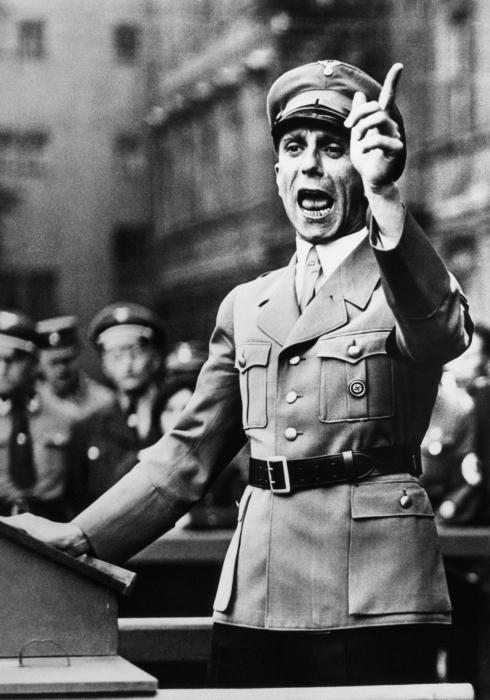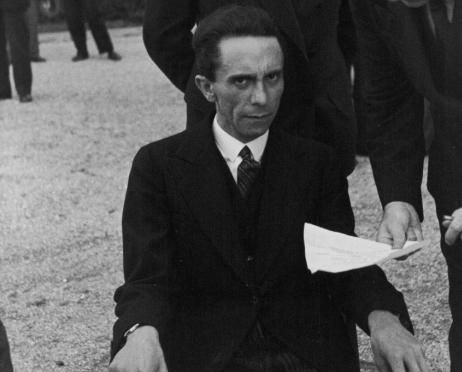Paul Joseph Goebbels - one of the main propagandists of the Third Reich, an important figure in the Nazi party, ally and confidant of Adolf Hitler.
Biography
Goebbels was born in Reidt on October 29, 1897. His parents had nothing to do with politics. The father was an accountant and hoped that his son, when he grew up, would become a Roman Catholic priest, but his plans were not destined to come true. Goebbels himself wanted to be a journalist or writer, so he devoted all his strength to the study of the humanities.
He had to study at several universities in Germany, where he studied literature, philosophy, German studies. At the University of Heidelberg, he even received a degree, defending a thesis on romantic drama.
World War I
This period was not difficult for Goebbels in comparison with his compatriots, because he was declared unfit for army service because of the lameness from which he had suffered since childhood. This greatly affected the pride of the future ideologist of the Third Reich. He was disgraced because he could not personally serve his homeland during the war. The inability to participate in the confrontation probably greatly influenced the views of Goebbels, who would later advocate the need for purity of the Aryan race.
Start of activity
Oddly enough, Paul Joseph Goebbels made many attempts to publish his works, but not one of them was successful. The last straw was the fact that one of the plays he wrote refused to stage the Frankfurt Theater. Goebbels decided to direct his energy in a different direction and went into politics. In 1922, he first joined the NSDAP political party, which was then led by the Strasser brothers.
He later moved to the Ruhr and began working as a journalist. During this period of his activity, he opposes Hitler, who, according to his own words, should have been expelled from the National Socialist Party.
Ideological changes
However, very soon the views of the philosopher change, and he goes over to the side of Hitler, whom he begins to deify. In 1926, he boldly declares that he loves Hitler and sees him as a real leader. It is difficult to say why Joseph Goebbels changed his views so quickly. Quotations, however, show that he praises the Führer and sees in him an exceptional personality that can change Germany for the better.
Hitler
The praises of Hitler, which Goebbels actively disseminated, led to the fact that the Fuhrer became interested in the personality of this propagandist. Therefore, in 1926, he appointed the future ideological leader of the Third Reich as the regional Gauleiter of the NSDAP. During this period, his oratorical abilities especially developed, thanks to which in the future he would become one of the most influential personalities of the Nazi party and the entire German government.
From 1927 to 1935, Goebbels worked in the Angrif weekly, which promoted the ideas of National Socialism. In 1928, he was elected to the Reichstag from the Nazi party. During his speeches, he actively speaks out against the Berlin government, the Jews and the Communists, after which he attracts the attention of the public.
The popularization of Nazism
In his speeches, the philosopher speaks out about fascist ideas, supporting the views of Hitler. For example, the criminal Horste Wessel, who was killed in a street brawl, he publicly recognizes as a hero, a political martyr, and even offers to officially recognize his poems as the anthem of the party.
Party Promotion
Hitler really admired everything that Goebbels promoted. Joseph was appointed chief of the Nazi Party propaganda leaders. During the 1932 election, Goebbels was the ideological inspirer and the main organizer of the presidential campaign, doubling the number of voters of the future Fuhrer. That is, in fact, he contributed to the fact that Hitler managed to come to power. It was his propaganda that had the most serious effect on the electoral masses. Learning from the Americans the latest tricks of the presidential campaigns and slightly changing them for the German people, Goebbels used a subtle psychological approach to influence the audience. He even created ten theses that every National Socialist must adhere to; later they became the ideological basis of the party.
As Reich Minister
In 1933, Goebbels received a new position, which greatly expanded his powers and gave him considerable freedom of action. In his work, he showed that in reality for him there are no principles of morality. They were simply neglected by Joseph Goebbels. Party propaganda penetrated all spheres of life. Goebbels controlled the theater, radio, television, the press - everything that could be used to popularize Nazi ideas.
He was ready to do anything to impress Hitler. He controlled attacks directed against the Jews. In 1933, he ordered books to be burned publicly at several German universities. Affected authors advocating for the ideas of humanism and freedom. The most popular of them are Brecht, Kafka, Remarque, Feuchtwanger and others.
How Goebbels lived
Joseph Goebbels was one of Adolf Hitler's most influential advisers along with Himmler and Bormann. They were also friends. The wife of the most important and influential propagandist of the Third Reich - Magda Quant - was the former wife of a Jewish businessman, she gave six children to the Nazi ideologist. Thus, the Goebbels family became a model, and all the children remained favorites of the Fuhrer’s entourage.
Women and Nazi Party Leaders
In reality, not everything was so cloudless in the life of the German ideologist. It cannot be called monogamous, given that he has been seen many times in relations with film and theater actresses, which has discredited him a lot in the eyes of the Führer. Once the disgruntled husband of another diva, whom Goebbels looked after, beat him. He had a rather serious romance in his life with an actress of Czech origin Lidia Barova, who almost led to a divorce from her legal wife. The marriage was saved only by Hitler's intervention.
Goebbels did not always have good relations with other prominent leaders of the Nazi party. For example, he could not find a common language, which led to constant disagreements, with Ribbentrop and Goering, who did not celebrate him because of his friendly relations with Hitler.
The Second World War
Despite the fact that Goebbels was a master of his craft, even his propaganda techniques could not help fascist Germany win the Second World War. During this period, Hitler set before him the task of maintaining the patriotic spirit and mood of the nation. He tried to do it in every way possible. Goebbels's main lever of pressure was propaganda against the Soviet Union. Thus he wanted to support the front-line soldiers so that they would stand to the last and fight to the end.

Gradually, the fulfillment of the task set by the Third Reich before Goebbels became increasingly difficult. The morale of the soldiers fell, although the Nazi propagandist fought the opposite, constantly reminding everyone that Germany would face if the war were lost. In 1944, Hitler appointed Goebbels chief mobilization, from that moment he was responsible for collecting all material and human resources, and not just for maintaining the spirit. However, the decision was made too late, before the fall of Germany there was very little time left.
Fall and death
Goebbels remained faithful to his Fuhrer, who was for him the embodiment of ideological ideals. In April 1945, when the further fate of Germany was already understood by the majority, Goebbels nevertheless advised his mentor to stay in Berlin in order to preserve for posterity the image of a revolutionary hero, and not a coward who fled from danger. Until recently, his faithful friend Joseph Goebbels took care of the image of his comrade-in-arms. The biography of the most famous German propagandist shows that he was one of the few who did not leave the Fuhrer.

After the death of Roosevelt, the mood in the Third Reich improved, but not for long. Hitler soon wrote a will in which Joseph Goebbels was named as his successor. Quotes from this period show that the propagandist was trying to come to terms with the Russians, but after nothing came of it, he and Bormann decided to put an end to life. At this point, Adolf Hitler was already dead. Goebbels's wife - Marta - poisoned her six children, and then laid hands on herself. After that, one of the most influential persons of the Third Reich - Goebbels Joseph - committed suicide. “The Diaries of 1945” - this is part of the manuscript heritage that remained after the most famous ideologist of Nazism - perfectly show what the author was thinking about during this period and what end he expected.
Advocacy and Records
Goebbels left a lot of handwritten documents that were supposed to maintain the fighting spirit of the German inhabitants and set them against the Soviet Union. However, there is a work that is only partly devoted to politics, the author of which was Goebbels Joseph. “Michael” is a novel in which, although there are reflections on the state, it has more to do with literature. This work did not bring success to the author, after which Goebbels decided to turn to politics.
As noted above, the philosopher also has Nazi books in which he reflects on anti-Semitism, the superiority of the Aryan race, and so on. Joseph Goebbels, whose last entries are included in his Diaries of 1945, has for some time been classified as a banned author in Russia, and his book is considered extremist.
About Lenin
Oddly enough, Joseph Goebbels spoke positively about Vladimir Lenin, whom, it would seem, he should have despised as a representative of Bolshevism. Despite this, the German leader, on the contrary, writes that Lenin will be able to become the savior of the Russian people, to save him from problems. According to Goebbels, since Lenin came from a poor family, he is well acquainted with all the problems that the lower strata of society have to face, so he will be able to overcome any obstacles on his way to improving the lives of ordinary peasants.
Total
Goebbels Joseph was one of the most influential and famous figures of the Third Reich. He became one of the key figures that contributed to Hitler's rise to power, and until the last remained faithful to his imperious mentor, striving for world domination. If we theoretically imagine that Goebbels would not have been on the side of the tyrannical Fuhrer of Germany, but opposed him, there is a possibility that Adolf Hitler would not have become a ruler, and perhaps the Second World War would not even have begun, millions of lives would have been saved. Goebbels Joseph played a major role in the propaganda of Nazism, which served as the fact that his name is written down in history in huge, but bloody letters.